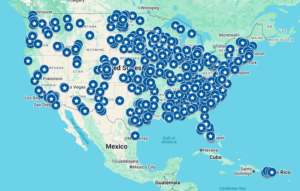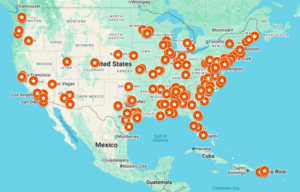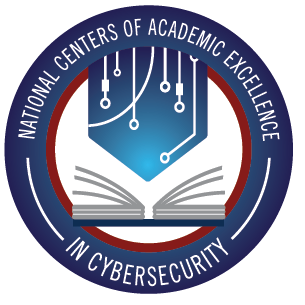
RING is provided at no cost through grants by the DoD, the NCAE-C program office located at the National Security Agency, and CAE institutions.
(Grant Numbers: HQ0034251E015, H98230-20-1-0333, H98230-21-1-0176, H98230-22-1-0312, H98230-24-1-0094)
“As a CTE high school teacher who has been in education for over 20 years, I have to say that I am so impressed with this curriculum. The content, integration with Google for Education tools, and the sequencing are completely on point.”
“I have just reviewed one of the first modules in the curriculum and I can’t believe how much NIGHT AND DAY difference there are just in the presentation slides. This is absolutely awesome. What we get with the online textbooks is very vanilla and the level of ENGAGEMENT that I can see will happen with these materials is very exciting! Thank you so much for the access to these materials.”
“In reviewing the first two units, this is outstanding and I’m using it for my Introduction to Cybersecurity course and next semester will continue using it with my Cybersecurity II students. I love it and am looking forward to seeing the next units.”
“I feel very fortunate to have found this curriculum. The materials and assignments are meaningful and high quality. Thank you to all who have played a part in creating this opportunity for students. I appreciate the organization, thought, and time that went into putting this together.”
“I like the way the curriculum is worded to easily convey information to high school students.”
“Your lesson plans are detailed down to the day with all support documents easily identifiable. This could not be better. Way above what would be expected.”
What Is RING?
RING (Regions Investing in the Next Generation) is an online high school cybersecurity course that offers interesting and engaging content specifically for students and schools without an existing cybersecurity program. RING aims to mentor students down their career path, instilling ethics and pride in their profession along the way. RING is more than a collection of labs and presentations–it’s forging the tools that will shape the next generation of cybersecurity experts.
- Students can achieve high school credit for RING at participating schools.
- Students can engage with each other and network with cyber professionals through the RING student organization.

Information for Educators
Educators interested in using the RING curriculum or offering a RING course should complete the RING Curriculum Request Form.
- RING course content is provided at no cost through grants by the NCAE-C program office located at the National Security Agency and through partnerships with CAE-C institutions.
- The RING course consists of 180 content hours and includes detailed lesson plans, instructional slides, activities, hands-on labs, graphic organizers, review games, and assessments.
- The RING program offers limited teacher and student accounts for a free cybersecurity range.
- The RING program has an associated honor society and student organization.
- RING has been vetted by Center of Academic Excellence in Cybersecurity (CAE-C) colleges and universities.
- RING has been pilot tested with high school students.

Nearly 1,600 educators in all 50 states, DC, and Puerto Rico have accessed the RING curriculum. January 2026
“This class has changed the way I understand cybersecurity. I know a lot more than I did before taking the class.”
“I am really happy that I found this course as it sparked a strong interest in computer science for me. I am thinking of pursuing cyber-related jobs as my career.”
“I just like it so much I can’t stop myself from looking up more about the topic . . . this is probably my favorite class this year.”
“This class was amazing!”
“I loved this program a lot, it helped spark my interest in cybersecurity. I hope I can have cyber as a minor in college because this course has helped me realize how important cybersecurity is in the real world.”
“When I first started RING, I was unsure of how the course would be – it was my first time in a while doing an online course, especially where I didn’t know anything….However, after completing this course, I can proudly say that I can explain to my family and peers about cybersecurity, at least the basics.”
“This course showed me that cybersecurity is something I’m interested in and passionate about, so I’m really glad I got the opportunity to take it.”
Current Course Options

312 students have completed the course through the centralized program.
- Summer 2026 (May 2026 – August 2026) *fast-paced course
- Full Year 2026 – 2027 (August 2026 – May 2027)
- Fall 2026 (August 2026 – December 2026) *fast-paced course
High school students who are interested in participating in a RING class should fill out the Student Enrollment Request Form.
- The RING course has been generously provided at no cost through grants by the DoD, the NCAE-C program office located at the National Security Agency, and CAE institutions.
- Classes are online and asynchronous to accommodate student schedules.
- RING grades can be reported for credit to participating schools.
- Students can engage with each other and network with cyber professionals through the Ring Student Organization.
RING AI (coming soon!)
RING AI is an artificial intelligence course for high school students mapped to the Alabama High School Course in AI, the CAE AI Foundational Knowledge Units, and work roles from the DoW Cyber Workforce Framework. The course includes 150 content hours across the following topics.
- AI History and Core Concepts
- Types and Applications of AI
- Applications and Safety of AI
- Applied and Specialized Machine Learning
- Machine Learning in Cybersecurity
- AI Ethics
- Laws and Governance of AI
- AI Policies and Best Practices


What Is a Center of Academic Excellence in Cybersecurity?
Institutions that receive a CAE-C designation have met the rigorous requirements set forth by the sponsor of the program, the National Security Agency (NSA). The NSA awards CAE-C designations to institutions that commit to producing cybersecurity professionals that will reduce vulnerabilities in our national infrastructure.
Leading Institutions: The University of Alabama in Huntsville & Moraine Valley Community College
The University of Alabama in Huntsville coalition:
- Coastline Community College
- Dakota State University
- Pace University
- Purdue University Northwest
- Dark Enterprises
Moraine Valley Community College coalition:
- Forsyth Technical Community College
- Brookdale Community College
- Florida State College at Jacksonville
- Cal Poly Pomona
- Eastern New Mexico University Ruidoso



